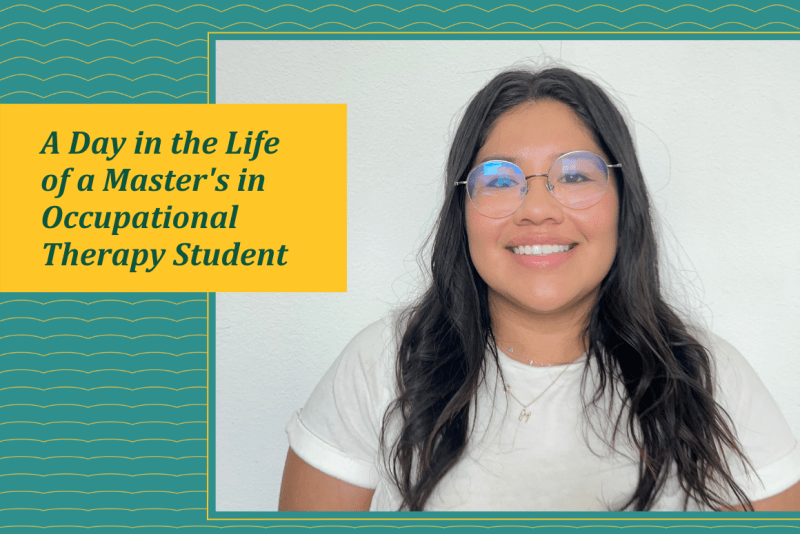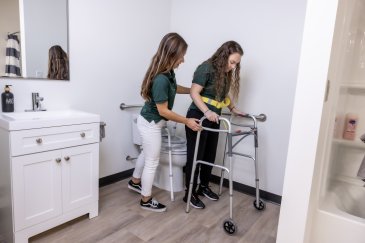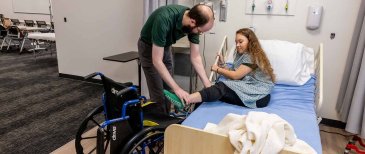
Occupational therapy (OT) is a fulfilling field where practitioners help individuals achieve independence and improve their quality of life. For students pursuing a Master’s in Occupational Therapy (MSOT) at Point Loma Nazarene University (PLNU), the journey is rigorous yet deeply rewarding. They prepare to make meaningful impacts in diverse communities through a balance of coursework, fieldwork, hands-on learning, and evidence-based curriculum. Here’s an inside look at what it means to be an MSOT student, featuring insights from current student Marcela Arroyo.
What is an MSOT Degree?
A Master’s in Occupational Therapy (MSOT) prepares students for a career helping people regain or develop essential life skills. Through a combination of coursework and clinical rotations, students gain theoretical knowledge, practical skills, and field experience. At PLNU, the program emphasizes evidence-based practices, holistic care, and community engagement. Graduates are equipped to work in various settings, from hospitals to schools to underserved communities.
A Day in the Life: Balancing Coursework and Fieldwork
MSOT students balance academic rigor with practical experience. Marcela’s week provides a glimpse into the life of a second-year MSOT student:
- Monday & Wednesday: In-person classes at PLNU’s Balboa campus, diving into topics like research methods, pediatrics, and community practice.
- Tuesday: Zoom class focused on Research Methods II, exploring evidence-based practices in OT.
- Thursday: Fieldwork through the Community Practice Seminar, where students work in settings without OT services, such as physical therapy clinics. Marcela observes, plans, and proposes OT integration strategies for these sites.
Key coursework includes:
- OCC 6024– Research Methods II: Students will work in small groups to apply knowledge from previous research courses to conduct an evidence-based literature review, perform a needs analysis during a Community Practice Seminar, explore grant funding, and develop a proposal for OT services focused on health and wellness for underserved populations. They will engage with community partners and present their findings at the end of the term.
- OCC 6023– Level I Fieldwork B- Pediatric/Adolescent: This is the second Level I Fieldwork experience focused on improving skills in client interactions, analyzing developmental dysfunction, performing screenings, and implementing group interventions for children and adolescents.
- OCC 60015– Case-Based Learning Seminar: This case-based learning course is the second of four synthesis courses. It focuses on enhancing critical reasoning skills and understanding the connections between client, environmental, and social factors that influence occupational engagement and performance.
Fieldwork enriches the learning experience. For example, Marcela’s fieldwork in pediatrics began with observation and culminated in independently running OT sessions, applying classroom knowledge in real-world scenarios.
______
Who are you called to be?
Pursue your purpose at PLNU.
______
Marcela’s Journey to Occupational Therapy
Marcela’s journey to occupational therapy began with an undergraduate degree in Child and Adolescent Development from PLNU. Although she was initially unfamiliar with the field, her interest grew while working one-on-one with a child receiving OT services.
Early experiences, such as teaching transitional kindergarten, helped her recognize her passion for individualized care while exploring OT’s versatility revealing its potential to impact diverse populations and settings.
“My cohort [of 17 students] has created a strong sense of community and partnership, which has been really helpful in navigating the challenges of graduate school.”
At PLNU, the supportive environment of small cohorts and accessible professors played a significant role in her growth, fostering collaboration and mentorship. Marcela highlights how her cohort of 17 students has created a strong sense of community and partnership, which has been vital in navigating the challenges of graduate school and becoming an Occupational Therapist.
Inside PLNU’s MSOT Facilities
PLNU’s MSOT program offers state-of-the-art facilities designed to prepare students for hands-on work in the field. These include:

- Activities of Daily Living (ADL) Lab: Simulates apartment living with spaces like an office, bedroom, living room, kitchen, bathroom, and laundry. This lab helps students practice skills essential for enabling clients to live independently.
- Orthotics and Modality Lab: Provides training in making splints, using 3-D printing to fabricate adaptive equipment, and applying thermal and electrical modalities for patient care.
- Movement Lab: Focuses on treatments for children with special needs and rehabilitation for individuals with physical disabilities. This lab also includes hospital-like settings to support training in advanced rehabilitation techniques.

These facilities, totaling 4,059 square feet, reflect the diverse treatments provided by occupational therapists and help bridge the gap between classroom learning and clinical practice.
Advice for Aspiring OT Students
Marcela offers valuable advice for those considering a career in occupational therapy. She emphasizes how helpful it can be to connect with OT professionals and shadow them in diverse settings to gain a deeper understanding of the field’s variety and potential. While graduate programs can feel daunting, she encourages resilience, noting that the rewards outweigh the challenges.
“Shadowing professionals in different occupational therapy settings is really helpful to gaining a deeper understanding of the field and the potential within it.”
To manage stress, she recommends finding balance by incorporating activities you enjoy into your routine. Marcela also highlights the supportive environment at PLNU, where professors and peers play a significant role in fostering both personal and academic success.
Pursue your calling with an MSOT degree
For Marcela, OT is more than a career — it’s a calling to bridge gaps in communities and provide care where it’s most needed. Her future aspirations include working with bilingual families in South San Diego, focusing on early intervention for children aged 0–3.
If you’re passionate about making a difference and empowering others, an MSOT degree from PLNU could be your next step. With small cohorts, exceptional faculty, and hands-on learning opportunities, PLNU prepares students to thrive in this impactful field.
Are you ready to transform lives through occupational therapy? Explore PLNU’s MSOT program today!